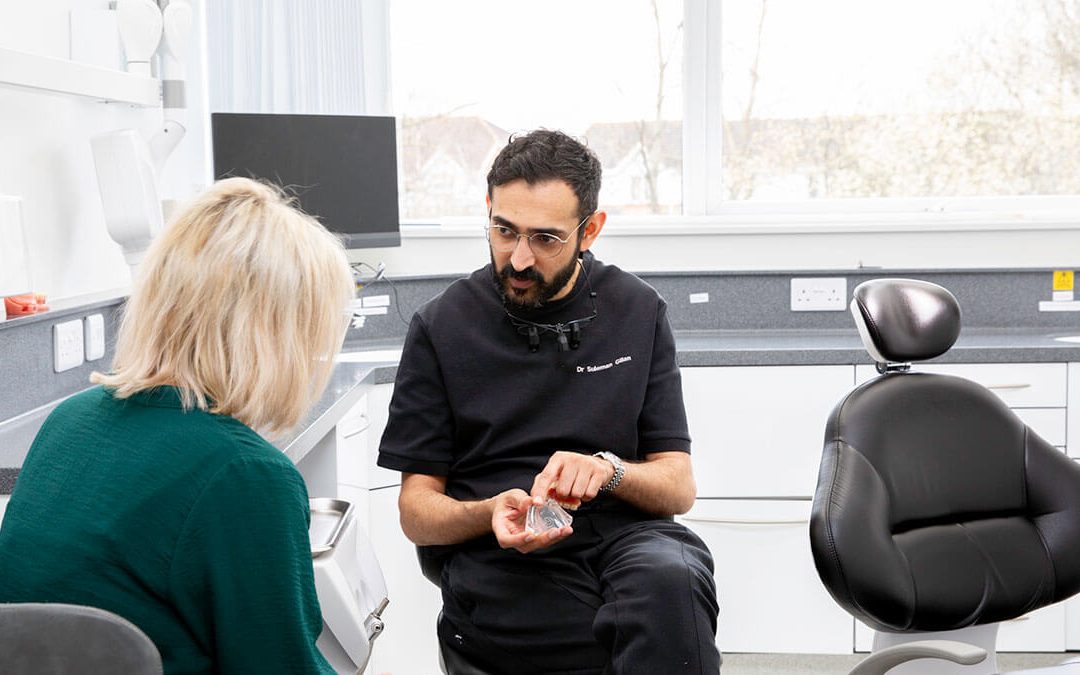Dental implants have become an increasingly popular solution for replacing missing teeth. Designed to mimic the function and appearance of natural teeth, they offer a long-term alternative to traditional dentures or bridges. Whether due to injury, decay, or age-related tooth loss, more patients are now considering implants as a permanent fix.
But with any surgical procedure comes the question: Are dental implants safe? For anyone thinking about this treatment, it is important to understand not just the benefits, but also the potential risks and how to minimise them. Here we review the key considerations.
What are dental implants?
Dental implants are artificial tooth roots—usually made of titanium—that are surgically placed into the jawbone to support a replacement tooth, bridge, or denture. Once inserted, the implant gradually fuses with the bone in a process known as osseointegration, providing a secure and stable foundation for the final restoration.
An implant-based treatment involves several stages over a few months:
- Initial assessment and planning – This includes scans, X-rays, and checks on your oral and general health.
- Implant placement – A minor surgical procedure, often done under local anaesthetic.
- Healing period – Over the next 3 to 6 months, the implant integrates with the bone.
- Restoration – Once healed, a crown, bridge, or denture is attached to the implant.
Dental implants can be used to replace a single tooth, several teeth, or even to anchor a full set of dentures.
In the UK, implants are mainly offered through private dentistry, as NHS dental services only provide them in exceptional cases, such as where there is severe trauma or a medical need. This makes it even more important to weigh the safety of the treatment before proceeding by checking the credentials of your provider.
How safe are dental implants in the UK?
When placed by a qualified professional and supported by good oral care, dental implants are considered a very safe and reliable treatment in the UK. In fact, implant dentistry has one of the highest long-term success rates of any dental procedure.
Evidence on Implant Safety
Information on the NHS’s Cambridge University Hospitals website states:
- An 80 to 95% success rate across the UK for patients with healthy mouths.
- Over 90% of implants bond successfully to the jawbone.
- Smokers have a much greater failure rate and will be expected to stop smoking several months prior to the surgery.
While implants are classed as a surgical treatment – and no surgery is entirely without risk – the rate of serious complications remains low when appropriate case selection, planning, and aftercare are in place.
NHS and Regulatory Oversight
In the UK, dental implants are regulated by the General Dental Council (GDC) and governed by best-practice guidelines from organisations such as:
- The Faculty of General Dental Practice – now part of the College of General Dentistry
- The Association of Dental Implantology (ADI)
These regulatory bodies help ensure that dental professionals offering implant treatment follow strict clinical protocols, maintain safety standards, and provide patients with adequate information before treatment.
In summary, when carried out correctly, dental implants provided in the UK are safe and effective with excellent long-term results. The key to safety lies in proper planning, ensuring the patient’s health is conducive to the treatment, and consistent follow-up care.
What are the risks?
While dental implants are generally safe, it is important to be aware that, like any surgical procedure, they carry some risks.
Biological Complications
These relate to the body’s reaction to the implant and surrounding tissues:
- Peri-implant mucositis – A reversible inflammation of the gums around the implant. It affects up to 50% of patients and is usually caused by plaque build-up or poor oral hygiene.
- Peri-implantitis – A more serious infection that can lead to bone loss and implant failure. Studies suggest this affects around 10 to 15% of implants long-term, especially if not detected early.
- Failed osseointegration – Sometimes the implant does not properly bond with the jawbone. This can happen in the early healing phase and may require the implant to be removed.
- Nerve damage or sinus problems – Rare but possible if the implant is placed too close to sensitive structures. Thorough pre-operative planning and 3D imaging significantly reduce this risk.
Mechanical Complications
These issues relate to the components used in the implant system:
- Loose screws or abutments – The connectors between the implant and crown may loosen over time.
- Crown or bridge fractures – The visible parts of the implant can chip or break, particularly under excessive biting force.
- Wear and tear – While implants themselves are made to last, the attached prosthetics may need repair or replacement after 10 to 15 years.
Who is most at risk?
Certain health and lifestyle factors can increase the risk of complications such as infection, implant failure, or delayed healing. Knowing these risk factors helps patients take steps to improve their chances of success.
You may be at higher risk if you:
- Smoke – Smoking reduces blood flow, slows healing, and significantly increases the risk of implant failure.
- Have certain medical conditions – Conditions such as diabetes, osteoporosis, or autoimmune disorders can affect bone healing and increase infection risk.
- Struggle with oral hygiene – Poor brushing and flossing habits can lead to gum disease and implant-related infections.
- Have low bone volume or density – Insufficient jawbone may not support an implant without additional procedures like bone grafts or sinus lifts.
- Choose an inexperienced practitioner – A dentist without proper implant training may increase the risk of surgical errors or poor long-term outcomes.
The good news is that many of these risks can be reduced with careful planning, lifestyle changes, and choosing a well-qualified dental team, such as the team here at Gallions Reach Dental Clinic.
Worried about the safety of dental implants?
Dental implants are a safe and effective way to replace missing teeth, with high success rates and long-term benefits when properly planned and cared for. While some risks do exist, they can often be managed or avoided with the right dental support. If you have any concerns or would like personalised advice about whether implants are right for you, the team at Gallions Reach Dental Clinic is here to help – don’t hesitate to get in touch.
BDS (Lon), DPDS (Bris), D Imp Dent RCSEd, DwSi
GDC: 73460
Born in 1974 in Brentwood, Essex, Daniel ‘always wanted to be a dentist’ and proudly qualified from The Royal London Hospital in 1997. He has worked at Gallions Reach since 2001. His hobbies include running marathons and recently (unsuccessfully) attempting to swim the English Channel. A season ticket holder at Upton Park, Daniel keenly follows the ups and (mainly) downs of West Ham United!



